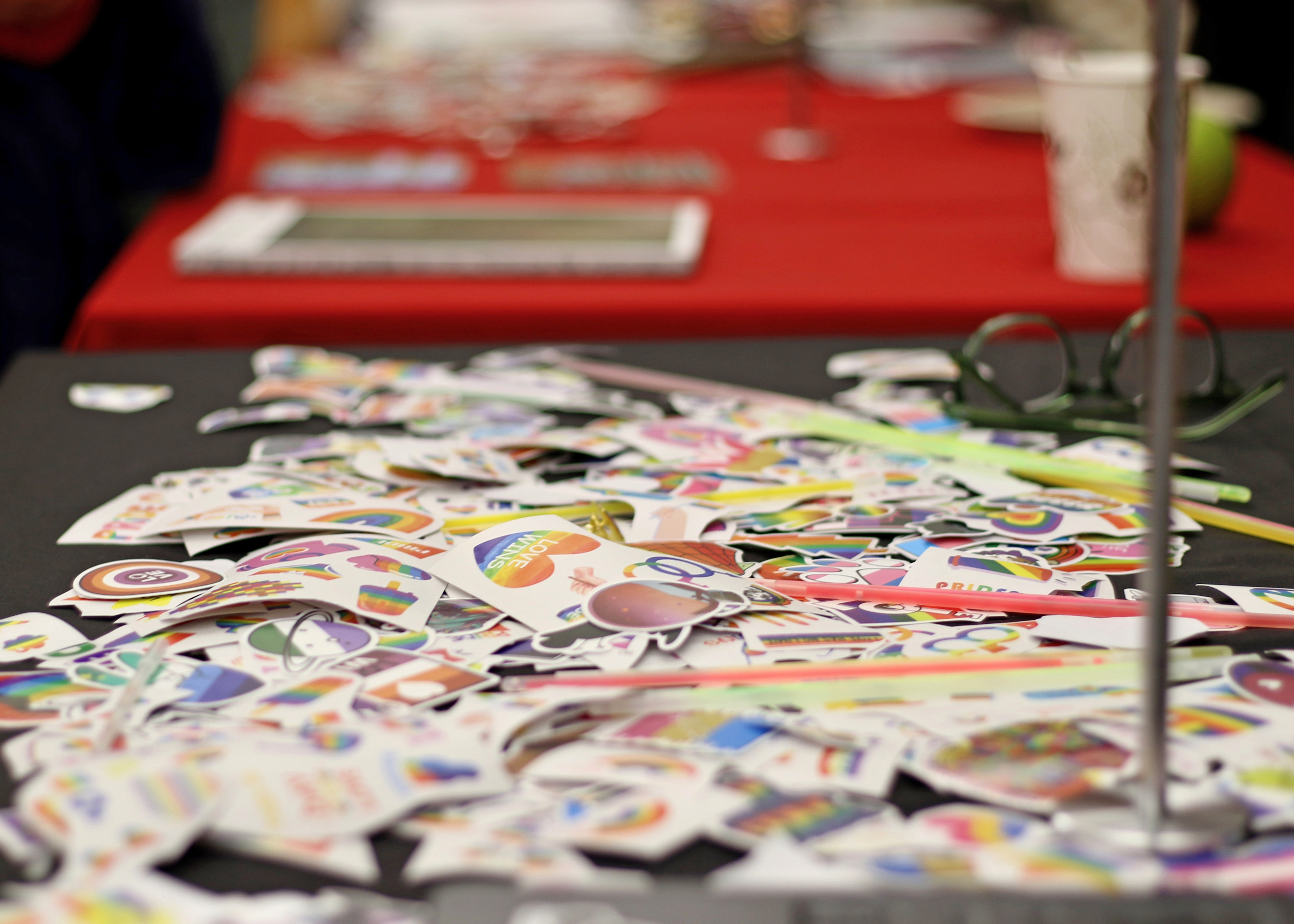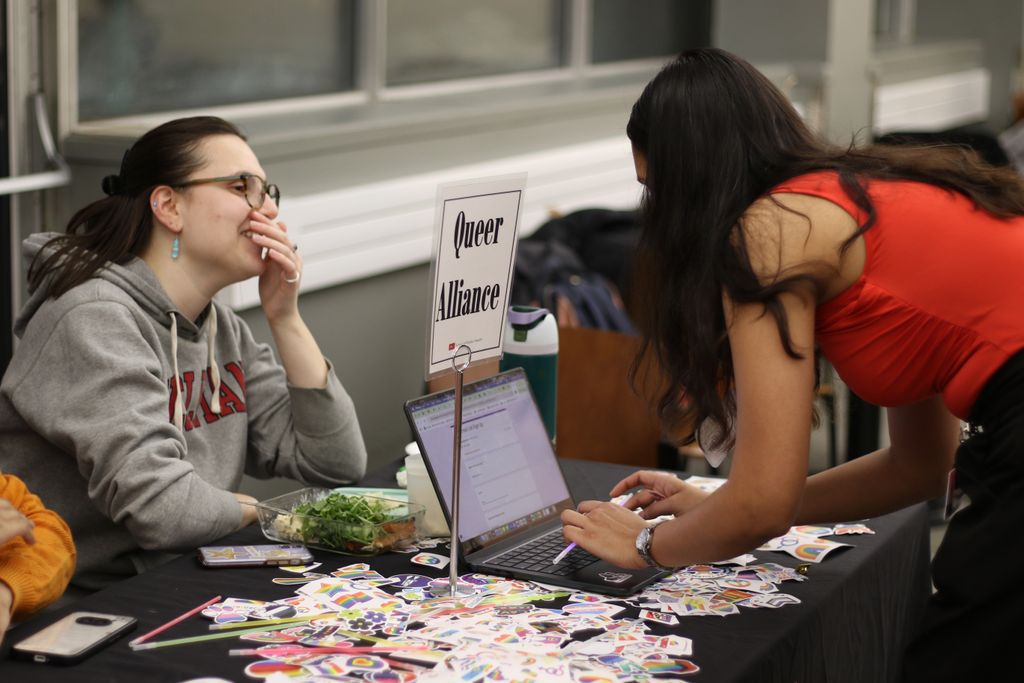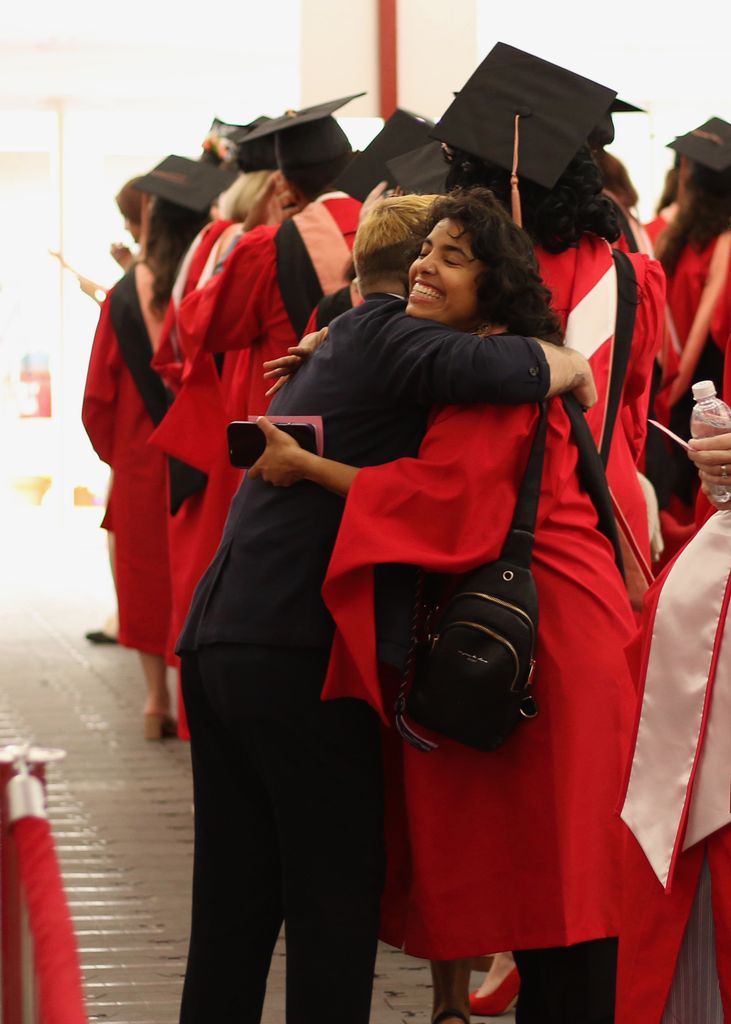‘A Safe Space’ Queer Alliance Student Leader Talks Pride Month and More.

A rainbow, heart-shaped sticker that reads “Love Wins” sits atop a pile of Pride-related stickers on a table advertising SPH’s Queer Alliance at the spring student organization fair. Photo: Megan Jones
‘A Safe Space’ Queer Alliance Student Leader Talks Pride Month and More
Lucas Nurmi, a new member of SPH’s Queer Alliance, discusses why he joined the student group and how he hopes QA can serve as a safe space for celebrating queer identities year-round.
Lucas Nurmi does not mince words in describing how he came to embrace his queer identity. He was driven by fear to come out, he says.

It was his first year of college studying public health at Drew University, a small Methodist university in Madison, New Jersey and Amy Coney Barrett had just been confirmed to the U.S. Supreme Court. Nurmi worried that the Court’s increased conservative majority and Coney Barrett’s views on marriage equality and transgender rights would jeopardize existing legal protections and erode progress towards securing equal rights for LGBTQ+ people.
“I was like, ‘I need to get this ball rolling before we start seeing—God forbid—criminalization of queer identities,” says Nurmi. “I want the people in my life to know this is important to me.”
During high school, Nurmi amassed a small collection of queer friends whom he credits with buoying him as he explored his identity, but he struggled to find an equally meaningful community in college. “I clung to them as my lifeline and very grateful for that,” he says.
When Nurmi graduated in 2024 and moved to Boston to attend SPH, he quickly grew fond of the city but continued to find meaningful connections difficult to establish. Then, he happened to be in a meeting with Julia Lanham, assistant dean of careers and practicum, when she mentioned that SPH’s Queer Alliance (QA) was currently meeting downstairs. He went down to catch the tail-end of the event and after enjoying some pickle chips with likeminded peers, he signed up to join the group.

“I realized that I really wanted to try to make this a more visible fixture on campus,” says Nurmi. “We’re seeing a lot of our identity-based clubs lack membership. Bringing that connection that I [have] desperately wanted—I think [is] really important.”
Four members of QA’s executive board graduated this spring, including Aisha Ghorashian who spoke with SPH on behalf of QA ahead of Pride month last year. Nurmi is one of four new incoming members. Over the past year, the group has moved away from a traditional leadership structure for a more shared style of governance, reports Ryan Wisniewski, assistant director of the practicum program and advisor to QA.

“Everyone pitches in and runs the club collectively without titles,” Wisniewski says. “It has worked miraculously. I am so proud of the QA and the work of the outgoing members who graduated and am excited to work closely with new e-board this fall.”
The student group has continued their successful series of “Lavender Lunches,” featuring faculty and staff members who either identify as queer or work on LGBTQIA+ issues. Guest speakers included Carlos Rodriguez-Diaz, chair and professor of community health sciences; Gabriel Murchison, assistant professor of community health sciences; David Jernigan, professor of health policy, law and management; Katy Collins and Allison Reilly, director and assistant director of the LGBTQIA+ Student Resource Center at BU; and Wisniewski. The group also hosted a book club, game night, karaoke, a Tarot party in honor of Trans Day of Visibility, and several other events organized in partnership with other BU queer affinity groups.
“Taking over as advisor is one of the best decisions I have made in my 7+ years at SPH,” says Wisniewski. “As trans folks and queerness comes under attack at a national level, it is so important for SPH to have a space to welcome these students and act as a safe place to be themselves during their demanding graduate course-load.”
Nurmi shared with SPH his vision for growing QA, his perspective on the challenges facing the queer community today, and his advice for allies.
Q&A
With Lucas Nurmi, MPH student
You mentioned that one of your priorities this fall is to increase QA’s visibility on campus. Could you expand on what other goals you have for QA and what you have talked about with other group leaders?
Obviously, it’s been a really scary time for queer rights and human rights as a whole throughout the country, and we’re talking about how people want a safe place to be queer. People are looking for social events where they can meet with other queer people and have that connection to people, so want to have a greater emphasis on just the social connection events—fun stuff. Even if it isn’t as directly related to being queer, [like what] we’ve had with the Lavender Lunches, we want to start having a wider variety of programming. Advertising has been pretty difficult because it’s just difficult to drum up interest when all you have is an Instagram. There are so many people who just aren’t on Instagram anymore, especially queer people who are avoiding Instagram and Facebook because they don’t approve of Meta’s new policies that explicitly allow discrimination against transgender people.
What does meaningful queer representation look like to you, on campus or more broadly?
I’m going to speak very broadly here, about multiple groups and not just queer groups, but I think we’re at a time period where people want to be explicitly told not just, “We are here for you, we support you,” we want explicit confirmation from the school administration, saying, “We will stand up for you if need be.” And, God forbid, something happens, “We will protect you.” I think that’s where a lot of my feelings are right now.
This is widely understood to be a particularly difficult time for the queer community given the current administration’s recent actions targeting LGBTQ+ rights. What do you see as the most prominent challenges facing the community, and what do you feel the community needs at this time?
I’ll start with what I think people are looking for the most, and again, it is just support from institutions and from their peers. If you’ve got queer friends, ask if they’re doing okay because it’s been a lot over the last few months. It’s a lot of stress. [Since] queer identity is something that you can, in many cases, hide, there’s a lot of people who are questioning if it’s physically safe to be out and queer right now, [or] if going back in the closet is better for them. Obviously, that’s an individual decision—I can’t mandate that random people stay out in order to fulfill some kind of social quota, but it is sad. So, if you have a friend who ends up going back in the closet, just pay close attention. Ask how they’re doing. Ask if they’re still okay discussing that kind of stuff with you, because maybe they like to only be out to close friends.
Are there things that you are doing to take care of yourself and your mental health? Will you attend any Pride events next month?
I’ve been connecting more with my friends—that’s been really nice. A lot of my friends are also queer, so it’s nice to have that queer support group there. I’ve been volunteering. It’s good to make a difference. [It’s] an organization designed around providing people food. Finding an organization, finding that kind of physical way that you can give back—I think it’s a good way to ground yourself and to help out people who might be in a bad spot. [What I’m] saying is channel your crappy emotions into a productive thing going on—volunteer or channel your anger to get your housework done.
I went to New York City Pride in 2022, but I’m pretty COVID-conscious—I still mask as much as I can, so I haven’t really been a big event person. But I would really like to go to Boston Pride!
What do you think makes for a strong ally, and how can folks in the SPH community who don’t identify as queer still show up for queer classmates?
I think there’s a lot of overthinking when it comes to being an ally, because people assume that being queer is this difficult identity. Really, it just comes down to you have to be nice and maybe practice someone’s pronouns a little bit if you’re having trouble. There are websites online that can help you practice, or you can just stand in front of a mirror and say, “Oh, I like their pants. Their pants are so nice. They’re so cool, they’re so good at video games.” You just practice a little bit if you’re having trouble with that because practice makes perfect. I think there is a lot of queer allies who are getting in their own heads [because] they’re worried that they’re not doing well. We just appreciate that you care about us.
Email sphqa@bu.edu or message QA on Instagram (@busphqueeralliance) to get involved.
